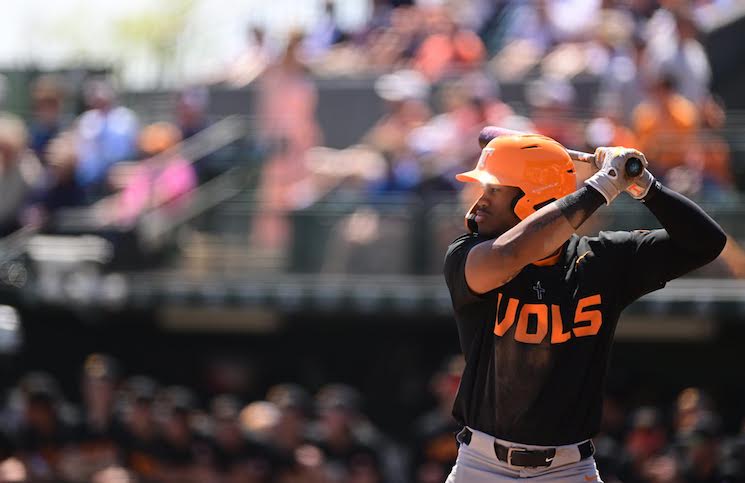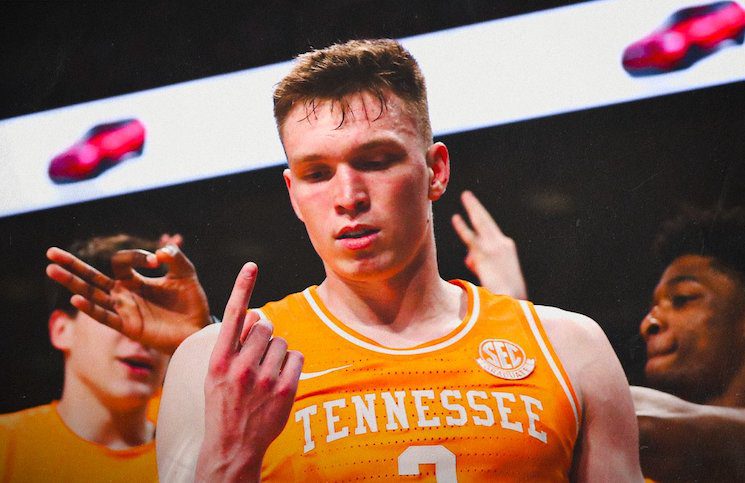
Unless you’ve been living on a remote island or actively avoiding reading, hearing, or seeing any sort of news over the last couple months, you likely know about the ongoing movement fighting against racial inequality and injustice in the United States.
Tennessee’s football team sure knows about it.
Several Vol football players and head coach Jeremy Pruitt took part in a peaceful protest in downtown Knoxville back in May, and Pruitt mentioned earlier this month that his players have expressed interest in wearing black jerseys against Kentucky this season and donating the money earned after auctioning off those jerseys to the local community in support of the Black Lives Matter movement (not the BLM organization itself).
Another way Tennessee is trying to enact change in the community and in society at large is by allowing players to use UT’s platform to let their voices be heard. And that’s exactly what Tennessee did this week.
Tennessee has been releasing a weekly podcast called “The Slice” where fans are given a more in-depth look into the lives of some of UT’s football players. On this week’s episode, offensive lineman Trey Smith, wide receiver Josh Palmer, cornerback Alontae Taylor, wide receiver Grant Frerking, and wide receivers coach Tee Martin all discussed the current climate around racial inequality and injustice in the US, and some of the players — and Martin as well — also opened up about experiences they’ve had with racism in the past.
That wasn’t all that was covered, however.
Host Kasey Funderburg asked UT’s players if they believe there’s a double standard with how black athletes are treated and how black non-athletes are treated in society. According to Josh Palmer, he believes that’s very much the case, and he also wants Vol fans to care about him and his teammates as more than just players.
“I think so,” Palmer said when asked if black non-athletes are treated differently than black athletes. “One thing I wanted to talk about was that you see a lot of guys from other schools doing a lot of stuff on social media, and a lot the fans will reach out to those guys and say, ‘oh I was a season ticket holder for this long and this and that and I’m no longer coming to the games because of whatever’s going on.’ But if you actually look at it for what it is, they’re basically saying they’re not coming to the games anymore because y’all are standing up for y’allsevles.
“So, at this point, any fans out there, if you guys don’t support us as human beings, don’t come to the games. I’d rather have nobody in the stands than a bunch of fakes and people pretending they like us just because we entertain them. So stay home, for real.”
Trey Smith, Tennessee’s preseason All-American guard and winner of both the Fritz Pollard Trophy and the Jason Witten Collegiate Man of the Year Award, agreed with Palmer’s sentiment.
“I second that, 100 percent,” Smith stated. “At the end of the day, I’m not here for your simple amusement and entertainment. I’m also a human being. I can think, I’m educated, I speak well. I’m still a person. At the end of the day, we can’t remain muzzled up all the time. We have to speak our mind. That’s our right; it’s an American right, the freedom of speech. So if you don’t like what you see, then keep it moving. There’s nothing really keeping you here.
“From this point on, if you’re not with it, then you can leave. That’s okay, because we’re moving forward, and that’s progress.”
(Note: Both Palmer and Smith took to Twitter on Tuesday to clarify their statements further and add that they were not attacking Vol fans nor was it a politically-charged statement. You can read Palmer’s statement here and read Smith’s statement here.)
What both Palmer and Smith had to say echoes a statement that UT released back on May 31st. Athletics Director Phillip Fulmer and all 15 of Tennessee’s head coaches across all of UT’s athletics program issued a joint statement in support of UT’s black student-athletes, and Fulmer asked for fans to support players not only on the field, but while they’re off it as well.
“Vol Nation, let’s rise to the challenge to meet a new standard,” Fulmer said in the statement. “If you’re going to support our black student-athletes when they compete, please have the courage to support them and their families in their daily pursuit of peace, happiness and equity.”

Wide receivers coach and former Vol quarterback Tee Martin is familiar with what it’s like to be treated differently off the field than when he was on it. Martin played quarterback for Tennessee in the late 1990s and helped lead the Vols during their undefeated, national championship-winning 1998 season. Martin claims that he had multiple conversations, both as a player and as a coach, where things changed once people realized he was a player or a coach.
But it’s Martin’s hope that the more he and others share these stories and the more conversations that are had about these issues, the more society can change.
“There is this idea of black acceptance of where, before you knew who I was, you looked at me strangely. Then you realized, ‘oh you play for Tennessee,’ or ‘you coach at Tennessee.’ And now the conversation opens up to something totally different,” Martin explained. “You know, it happened to me as a player. You get the questions of, ‘oh you must play sports, you must play football.’ Well how do you know? Maybe I’m here for med school, or maybe I’m here just to get my education like you, why do I have to play football? That stuff happens all the time, and you just wonder why. Obviously it’s because of your skin color.
“But I think if we just continue to have these conversations and open up and allow people to be uncomfortable at times so we can get comfortable with being uncomfortable, we can progress as a society. Because that shouldn’t be the way you’re only accepted just because you’re an athlete or an entertainer, but you don’t like the rest of the race. That’s not good.”
It’s one thing to act respectful and accepting to a player’s face; it’s another to do it behind closed doors or when that player isn’t around. Tennessee’s players want that support not just when it’s convenient, but also when they aren’t there to see the direct results of those actions.
Though Grant Frerking himself is a white student-athlete at Tennessee, he says he empathizes with what some of his black teammates go through because of experiences they’ve shared with him. And he often wonders if some of the people who value his teammates as football players do the same when they aren’t face-to-face with them.
“Even just hanging out with my teammates like Josh, Alontae, and Trey on the weekends or at night sometime, you have guys who come up and want to take pictures and get autographs and be your buddy at the bar. But is that the same kid that’s saying something on Twitter? Or is that the same kid who’s gonna say something to his white friends back at home or make a joke back on campus about something?” Frerking said. “I know that stuff is real, and people act differently when they see you as someone who can be an advantage for them. You know, ‘I can take a picture with Trey or get Alontae’s autograph or Josh was hanging out with me at this place.’ They can put that on Snapchat so it looks like a big deal.
“But what do they think of Trey, Alontae, Josh, and all our other teammates and all other black men and women across this country on just an average Tuesday morning or Wednesday afternoon? Are they still coming up and being all supportive and wanting to be your best friend, or are they talking different?”
Aside from caring about Tennessee’s players when they aren’t wearing the orange and white on game day, what else can Vol fans do to help improve things? What else can be done to try and change what UT’s players have pointed out as issues in society?
According to Tee Martin, allowing players to even just express themselves without fear of backlash would be a positive step forward. Simply put: Treat others with respect and be open to different perspectives.

“Number one, the biggest change I’d like to see in college sports and in general in society is this idea of these young men feeling that they have to get their minds right to have this conversation,” Martin explained. “Can I go all the way real without people going in my DMs or going on my social media page and feeling backlash or hearing backlash or losing relationships on my team? Can I be all the way real? Or do I take this interview and just say what’s politically correct, kinda get my feelings out, but not go there? I think we have to get past that. I think people have to understand that when you hear a black man or woman or a minority that’s speaking with so much passion that there’s pain behind it, there are real life experiences behind that voice.
“So until we can get to a point where people can speak their minds, a young man or woman can walk into your office or go on social media and totally speak their mind, and you just hear and see it for what it is, and you accept it and move forward with that, I think that more student-athletes would speak their minds because they won’t feel like they’ll be ridiculed or get backlash for being real, so to speak.”
That fear of backlash hasn’t stopped Trey Smith from speaking out on what he believes, but he says he’s noticed negative feedback from people and has seen some of that ridicule.
Smith also reiterated that if you’re just following him or any of his teammates because of the entertainment they can give as athletes but don’t care about their lives off the field, then that’s not what he or his teammates want.
“At the end of the day, we are still human beings. We’re intellectual people that have opinions on things and have the ability to share and express our opinions,” Smith said. “I look at my Twitter, and I lost about 200 followers as soon as I started speaking up on anything about this movement. So it’s sorta good riddance in those words because they’re too caught up in the entertainment aspect instead of learning about who is Trey Smith as a person.”
Tennessee’s players and Martin touched on several topics throughout the latest episode of “The Slice,” and you can find the full podcast here. If you don’t have an Apple device, the podcast is also on Spotify.




One Response
I have been a Vols fan seance the late 90’s. I do agree with the players and coaches. We have to change the way we look at people as a group. I coach a 10-12 year old baseball team, and I have children from all walks of life , rich poor and in between. We have to start early to break this cycle and I let my guys and parents know this. I praise GOD for my parents that raised me to be color blind , and I am doing the same with mine. This has to start at a very early age and continue through there lives. Good people are good people and just wanted to finish by saying the only color I see is Orange go Vols. Please let the players see this if possible. By the way I have used Eric Berry as a example for my child to show him how a real man handles him self. GOAT in life and on the field.